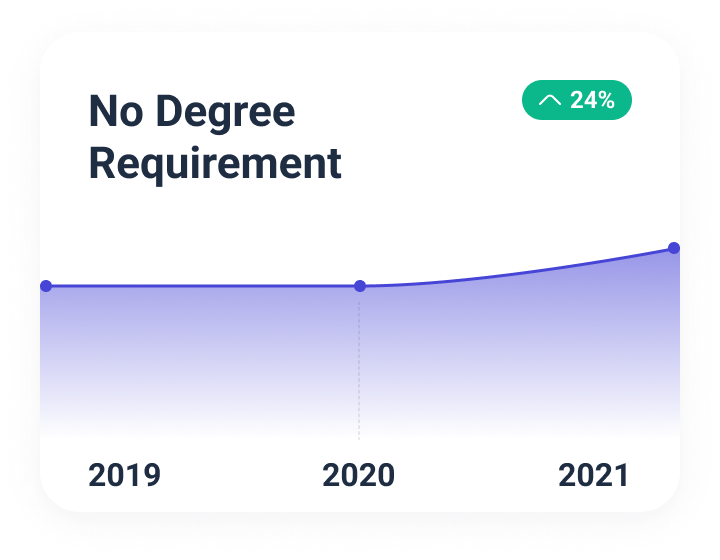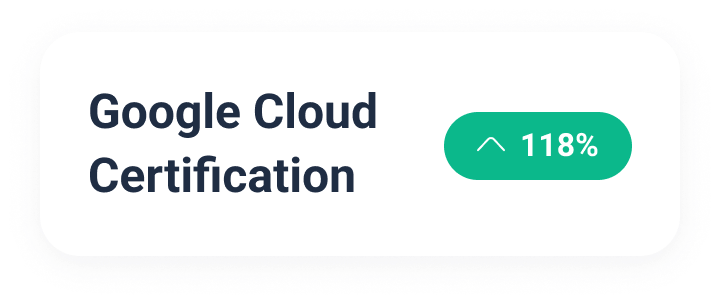Education requirements are a big part of the hiring process. Even entry-level professional jobs tend to require a college degree. However, more and more companies are rethinking education requirements on job posts, especially during a competitive job market.
The main question is whether a college degree is really necessary for every job out there. According to our analyses of real-world job posts, the answer is no.
Education requirements are essential on job posts for certain positions, but not all. If you’re hiring a nurse, for example, applicants will need either an associate’s or bachelor’s degree along with a license to practice as a registered nurse. If you’re hiring an administrative assistant, however, that person wouldn’t necessarily need a degree.
In recent decades, we’ve seen a shift towards including education requirements on virtually all job posts. (This despite many of the jobs that require a degree today not actually requiring one in the past.) We may be seeing a shift back. Our analysis of technology job posts from over 10,000 companies between 2019 and 2021 reveals a shift towards fewer education requirements. Which is a good thing, because listing education requirements on job posts that don’t need them can narrow the top of your applicant funnel.
Questioning education requirements on job posts
One of the latest recruiting trends is that employers are starting to rethink their approach to job description language and education requirements. In fact, some companies are hiring candidates without a college degree for certain positions.
“It’s really important for us to recognize that because people haven’t had an opportunity early in their lives, it doesn’t mean that they can’t make a real contribution to your company,” Kenneth Frazier, CEO of Merck & Co., told the Wall Street Journal.
Frazier and other business leaders are calling for a change to help address inequality in employment. An inequality that tends to hit historically underrepresented groups the hardest.
“They’ve turned college from a bridge to opportunity to a drawbridge that gets pulled up if someone hasn’t gotten through,” economist Byron Auguste told NPR.
Auguste, former deputy director of the National Economic Council and current CEO of Opportunity@Work, says “college degrees have become a proxy for race and class” (in the United States, anyway).
“If you arbitrarily say that a job needs to have a bachelor’s degree, you are screening out over 70% of African Americans,” Auguste told NPR. “You’re screening out about 80% of Latino-Latina workers, and you’re screening out over 80% of rural Americans of all races. And you’re doing that before any skills are assessed. It’s not fair.”
The competitive job market may be impacting education requirements
In 2019, tech jobs received a median of 120 applicants, but in 2021 that number had fallen to 77. The problem was simple: companies advertised over 80% more tech jobs in 2021 than they did in 2019. Meaning there were fewer applicants to go around, creating a competitive job market. (By the way, female representation in those applicant pools was only around 25%.)
(The increase in open tech jobs was the result of increased funding for startups and smaller companies as well as large valuations for some bigger companies. Basically, companies had money to spend on growth, so they advertised new positions.)
When there’s a competitive job market, as in the case of tech hiring in 2021, employers look for ways to attract more applicants. One of the ways they do that is by relaxing qualifications in job posts. While we found a couple of examples in the data that went the other way, the trend was for fewer education requirements in general.

This was also true for professional certifications. Generally speaking, companies listed fewer certification requirements on their tech job posts in 2021.
The outlier to this trend was cloud certifications. Our data showed that many more tech job posts required cloud certifications in 2021. Which makes sense, given the increase in use of these services and the fact that they all offer formal certification programs.


Be thoughtful about requirements on job posts
To be sure, education requirements are an absolute must in some cases. If you’re a healthcare facility hiring a nurse, you can’t skip them. Anyone you hire will need an associate’s or bachelor’s degree in nursing as well as a license as a registered nurse.
But even when education requirements are necessary, the requirements you list still need to fit the job. (A nurse needs an associate’s degree, not necessarily a bachelor’s degree.) And when professional experience can make up for a degree, you can simply include ‘or relevant experience’ alongside your education requirements.
It’s important to approach college degree requirements carefully. In fact, it’s important to thoughtfully clarify all job requirements. If you need some inspiration, here’s an example of a job post from our customer Conagra with a perfect list of qualifications.
Including years of experience, for example, can help establish the seniority of a position. (Our research suggests that listing years of experience helps clarify a role without being ageist. Our data shows that more tech job posts these days are defining seniority level more clearly.) But including a wide range of experience can be confusing. So, ‘2-8 years of experience’ should really just be ‘2+ years.’ Clarity means setting the minimum.
Meanwhile, adding ‘preferred’ requirements of any kind, whether for education, years of experience, or skills, can confuse job seekers. So, ‘bachelor’s degree with master’s preferred’ should really just be ‘bachelor’s.’
Generally speaking, also try to avoid using soft skills, cliches, and other filler for jobs that have fewer technical requirements. And don’t go the other direction and list every possible technical requirement imaginable. In other words, don’t list your entire tech stack for jobs that won’t be using the entire tech stack.
How necessary are education requirements, especially in a competitive job market?
Not everyone has the same opportunities for higher education. And the U.S. Supreme Court’s recent decision to effectively end affirmative action will make the divide worse. Yet there are talented, hard-working people who are willing to learn and grow all around us. When it comes to job posts, it’s important to stay true to the job and list only the minimum requirements needed to perform it successfully and therefore warrant a first-round interview.
That goes for education requirements, which our data shows are on the decline anyway, and for other requirements as well. Stick to the baseline to keep the top of your talent funnel as wide as possible.
If your hiring teams want or need help to do that, Datapeople’s Smart Editor for job descriptions offers guidance on best practices like these. Using responsible AI trained on real-world job posts, hiring outcomes, and behavioral research, our editor highlights potentially problematic job titles, language, requirements, and more. Request a demo today to learn how optimizing your jobs for inclusivity, compliance, and data-backed performance can make your entire hiring process more fair and efficient.
